
May 14
1867 Birth: Kurt Eisner in Berlin:

After studying literature and philosophy at Marburg he published Friedrich Nietzsche and the Apostle of the Future (1892). Eisner became a journalist and worked for the Frankfurter Zeitung. A member of the German Social Democrat Party, he edited several socialist newspapers including the SDP's Vorwaerts . . . . In April 1917 left-wing members of the Social Democratic Party (SDP) formed the Independent Socialist Party. Members included Eisner, Karl Kautsky, Eduard Bernstein, Julius Leber, Rudolf Breitscheild and Rudolf Hilferding.
On 7th November, 1918, Eisner successfully organized the overthrow of the Bavarian government. After becoming prime minister Eisner declared Bavaria a Socialist Republic. The following day Wilhelm II abdicated and the Chancellor, Max von Baden, handed power over to Friedrich Ebert, the leader of the German Social Democrat Party. Eisner made it clear that his Socialist Republic would be different from the Bolshevik Revolution in Russia and announced that all private property would be protected by the new government. Eisner persuaded the larger and more moderate German Social Democrat Party to join the government and was in the process of introducing several economic and social reforms when he was assassinated by Anton Graf Arco, a fanatical nationalist, on 21st February, 1919.
1880 Birth: Wilhelm List:
He joined the German Army and served throughout the First World War. After the war List joined [a] right-wing Freikorps group. He remained in the army where he became a tank specialist and eventually became chief of the Army Organization Department. He made gradually progress in the new German Army and in 1930 he was promoted to major general and was appointed head of the Dresden Infantry School. List had now developed more moderate political opinions and in 1931 he upset Adolf Hitler by disciplining young officers who were supporters of the Nazi Party.
In 1935 List was appointed by General Fedor von Bock as commander of the 4th Army Corps. Although List was still privately critical of Hitler he was unwilling to take any actions that would damage his army career. As a result he did not protest against the treatment of Werner von Blomberg and Werner von Fitsch in 1938. After the Anschluss List was sent to Vienna as head of the Army Group in Austria. The following year he took part in the invasion of Czechoslovakia. In September 1939, List served under General Gerd von Rundstedt in Poland. While visiting the country Wilhelm Canaris was shocked to discover that List had given permission for the mass executions of Jews by SS Units.
During the Western Offensive he led the 12th Army. He made good speed and his infantry reached the Meuse only a day after General Paul von Kleist and his panzer units. List intervened in the dispute between Kleist and Heinz Guderian that threatened to damage the success of the invasion of France. As a result Guderian came under List's command for the rest of the campaign.
Adolf Hitler was pleased with the role that List had played in the opening year of the war and on 10th May 1940 he was promoted to field marshal. He was then given the task of planning the invasions of Greece and Yugoslavia. He remained in the Balkans until being dismissed in October 1941.
List was recalled in July 1942 to command the Army Group in southern area of the Soviet Union. List led his troops into the Caucasus to capture the valuable oil fields. Hitler was disappointed by List's performance in the Caucasus. Despite the protests of Franz Halder and Alfred Jodl , Hitler dismissed List on 9th September, 1942 and he spent the rest of the war at his home in Garmish-Partenkirchen. After the war List was charged with war crimes and in February 1948 he was sentenced to life imprisonment. He was released in December 1952 on the grounds of ill health. Wilhelm List died on 17th August 1971.
1905 The Asiatic Exclusion League (AEL)—a racist anti-Japanese movement—is formed in San Francisco by 67 labor unions. The group's aims are to spread anti-Asian propaganda and influence legislation restricting Asian immigration. Specifically targeted are Japanese, Chinese, and Koreans. (Niiya)
[See: Countdown to Infamy: Timeline to Pearl Harbor.]1885 Birth: Otto Klemperer:
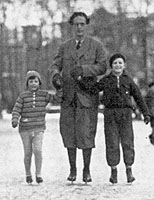
1915 World War I: List Regiment:

1916 World War I: Various:
List Regiment: Gefreiter Adolf Hitler endures trench warfare in Flanders (Artois) with 3 Company, 16 Reserve Infantry Regiment . [For further details, Click here.]
The Times (London) sparks "Shells Crisis":
A lead article in the Times of London proclaims that an insufficiency of munitions is leading to defeat for Britain on the battlefields of World War I. The article sparked a genuine crisis on the home front, forcing the Liberal government to give way to a coalition and prompting the creation of a Ministry of Munitions. [For further details, Click here]
1917 World War I: Various:
List Regiment: Gefreiter Adolf Hitler's 16 Reserve Infantry Regiment, 3 Company, participate in the Arras action, being deployed east of Vimy Ridge. [For further details, Click here.]
Russia: A coalition government is established, which includes several moderate socialists, in addition to Aleksandr Kerensky, who had been in the cabinet from the beginning. The participation of such socialists in a government that continues to prosecute the war and fails to implement basic reforms, however, only serves to identify their parties—the Socialist Revolutionaries, Mensheviks, and others—with government failure.
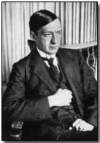
Kerensky: I came to you because my strength is at an end. I no longer feel my former courage, nor have my former conviction that we are conscientious citizens, not slaves in revolt. I am sorry I did not die two months ago, when the dream of a new life was growing in the hearts of the Russian people, when I was sure the country could govern itself without the whip. As affairs are going now, it will be impossible to save the country.
1918 World War I: Various: List Regiment: Gefreiter Adolf Hitler's 16th RIR is sent back to hold a sector near an earlier position at Laon. [For further details, Click here.] Russia: Fifty thousand well-equipped troops from the Czechoslovak Corps deploy along the Trans-Siberian railway, and soon seize several key cities on the Volga and in Siberia. (Polyakov)
1921 Italy: Fascism: Mussolini's Italian fascists obtain 29 parliament seats.
1927 Cap Arcona—a 27,500 gross ton German luxury ocean liner—is launched at the Blohm + Voss shipyard in Hamburg. On April 26, 1945, she was loaded with prisoners from the Neuengamme concentration camp near Hamburg and, together with two smaller ships, Thielbek and Athen, was brought into the Bay of Luebeck with the intention of destroying evidence of what had happened at Neuengamme by scuttling the ships with the prisoners imprisoned below. On May 3, 1945, four days after Hitler's suicide, but before Germany's surrender, the Cap Arcona, the Thielbek, and the passenger liner Deutschland (converted to a hospital ship but unmarked as such) were sunk in four separate attacks by RAF planes.
1935 Protocols of the Elders of Zion: A Swiss court, after almost two years of testimony and deliberations, rules that The Protocols are a forgery, and demoralizing literature. (See June 26, 1933 and November 1, 1937)
1937 Holocaust: Germany: Jews are forbidden to play music by Beethoven or Mozart during Jewish cultural concerts. [Would they have contaminated it ?—Ed.]
1940 World War II: Rotterdam bombed by the Luftwaffe: 600-900 die, as the Netherlands surrenders to Germany. Before launching his attack, Schmidt attempted to get Scharroo to surrender the city without a fight. Scharroo saw no immediate reason to surrender, and stretched out negotiations. The original start time for the attack had been set for 13:20. Schmidt postponed this to 16:20 and requested a delay in the aerial attack. However, just as the Dutch negotiator was crossing over the Willemsbrug to relay this information, the drone of many heavy bombers was heard. A total of 90 bombers from squadron KG54 arrived over the city at the old start time and at least 57 dropped their full load of bombs (according to German sources, consisting of 158X250 kg and 1150X50 kg bombs). Why the formation had not received the abort mission order sooner, remains controversial. [For further details, Click here.]
1941 Rudolf Hess' Flight:
Goering pointed his marshal's baton at my stomach. He shouted: 'So as far as you are concerned, anyone can apparently fly off in a Messerschmitt!' I asked him what he meant, to which Goering replied: 'You know this fellow Hess very well' I answered, 'But Hess is not just anybody.' Goering, who was gradually cooling down, said: 'You should have made inquires before you put a machine at the disposal of such a man.' I answered: 'If you came to my factory and asked for a plane, should I first ask the Fuehrer for permission to give it to you?' That angered Goering again, and he countered sharply: 'That is entirely different. I am the Air Minister." I replied, 'And Hess is the Fuehrer's Deputy.' 'But have you ever noticed, Messerschmitt, that the man was mad!' I replied dryly, 'How could I assume that a madman could occupy such a high position in the Third Reich? I think they should make him resign, Herr Field Marshal.' 'You are incorrigible, Messerschmitt. Go back and get on making aircraft,' Goering laughed. He then passed to political questions. He said that, on reflection, he had omitted to explain that there were two further conditions attached to his peace proposals. First, Germany could not leave Iraq in the lurch. The Iraqis had fought for Germany and Germany would, therefore, have to require us to evacuate Iraq. I observed that this was going considerably beyond the original proposal that German interests should be confined to Europe, but he retorted that, taken as a whole, his proposals were more than fair. The second condition was that the peace agreement should contain a provision for the reciprocal indemnification of British and German nationals, whose property had been expropriated as the result of war. Herr Hess concluded by saying that he wished to impress on us that Germany must win the war by blockade. We had no conception of the number of submarines now building in Germany. Hitler always did things on a grand scale and devastating submarine war, supported by new types of aircraft, would very shortly succeed in establishing a completely effective blockade of England. It was fruitless for anyone here to imagine that England could capitulate and that the war could be waged from the Empire. It was Hitler's intention, in such an eventuality, to continue the blockade of England, even though the island had capitulated, so that we would have to face the deliberate starvation of the population of these islands. Ernst Bohle is questioned by Heinrich "Gestapo" Mueller and Reinhard Heydrich concerning his part in Hess's flight. Bohle will later learn that Bormann had asked Hitler to sign an order for his arrest, but Hitler had refused to do so. From Dr Robert Kemper's account of his post-war conversations with Bohle: This (Hitler's unwillingness to arrest me) was incomprehensible if Hitler really was totally uninvolved. Even though I didn't know about the flight itself, I did far more to toward bringing it about than Hess's secretaries, chauffeurs, servants and others who were locked up. I was questioned for a long time on May 14 by Heydrich and Gestapo Mueller, but was told to go home. The only explanation I could think of was that Hess had told Hitler of the help I had given him, but had asked that I be let off if the thing went wrong and Hitler was forced to disallow him. (Sereny) Death: Maurice Bavaud: Would-be assassin:
Early this morning in 1941, a Swiss theology student had his head cut off at Berlin's Plotzensee Prison for plotting to kill Adolph Hitler.
Maurice Bavaud, 25 at his execution, cuts one of the more quixotic . . . of the many figures who schemed Hitler's death—and also one of the more affecting, for at this early date he might have spared Europe most of the great war's horror. But Bavaud was also, fundamentally, a poor assassin.
Apparently motivated by pique at Germany's repression of Catholicism, he [is] most commonly cast as a lone gunman, although there are also theories that he was affiliated with a wider network of students.
Bavaud slipped into Germany in 1938 and spent the ensuing weeks knocking around Bavaria looking for a chance to do the thing. That November, the chancellor turned up for the 15th anniversary of the Beer Hall Putsch . . . to which Bavaud secured VIP seating. The aspiring assassin had only a low-caliber pistol, but as the Fuehrer passed his vicinity . . . saluting arms from the spectators around him obstructed any chance to shoot. November 9, 1938 instead became famous for other reasons.
One can appreciate, at this juncture, the young man's discouragement and desire to leave Germany. One can understand that, penniless, he felt obliged to sneak aboard a passenger train. But one will strain very hard to imagine why even the most desperate straits should impel a man to do either of these things while still carrying the incriminating pistol and notes revealing his plans. When he was nabbed for skipping the fare, his situation quickly became catastrophic, with the help of Gestapo torturers. (One can see, in Bavaud's own hand, a 1940 letter to his family informing them of his sentence here.)
Switzerland essentially exerted no diplomatic effort on behalf of their subject, and this fact informed the Swiss courts which, years after the war, posthumously reduced Bavaud's sentence. Germany eventually paid reparations to the family of the man who tried to off their head of state.
Update: Maurice Bavaud has been officially rehabilitated by Switzerland.
1943 Various: World War II:
United States and Britain plan Operation Pointblank: Joint bombing to be mounted from Britain:
Operation Pointblank's aim was grandiose and comprehensive: "The progressive destruction and dislocation of the German military and economic system, and the undermining of the morale of the German people." It was also intended to set up "final combined operations on the continent." In other words, it was intended to set the stage for one fatal blow that would bring Germany to its knees.
The immediate targets of Operation Pointblank were to be submarine construction yards and bases, aircraft factories, ball bearing factories, rubber and tire factories, oil production and storage plants, and military transport-vehicle factories and stores. Ironically, the very day planning for Pointblank began in Washington, the Germans shot down 74 British four-engine bombers as the Brits struck a munitions factory near Pilsen. Joseph Goebbels, writing in his diary, recorded that the biggest setback about the British raid on the factory was that the drafting room was destroyed. (History.com)
War at Sea: Sinking of the Australian Hospital Ship Centaur off the coast of Queensland, by a Japanese submarine.
1944 World War II: Various: FDR and Churchill to Stalin: In order to give the maximum strength to the attack across the sea against Northern France, we have transferred part of our landing craft from the Mediterranean to England. This, together with the need for using our Mediterranean land forces in the present Italian battle makes it impracticable to attack the Mediterranean coast of France. We are planning to make such an attack later, for which purpose additional landing craft are being sent to the Mediterranean from the United States. In order to keep the greatest number of German forces away from Northern France and the Eastern Front, we are attacking the Germans in Italy at once on a maximum scale and, at the same time, are maintaining a threat against the Mediterranean coast of France. [See: Why Was Churchill Against the D-Day Invasion?]
Holocaust: Kosovo: Albanian SS unit rounds up Jewish families:
The division was founded as the 21. Waffen-SS Gebirgsdivision der SS Skanderbeg (albanische Nr.1) on 1 May 1944 as part of the XXI Mountain Corps. Most or all of the division's officers, non-commissioned officers (NCOs), and specialists were German, and were mainly provided by the 7th and 13th SS Divisions . . . . Early on, it became clear that most of the division's Muslim Albanian members seemed to be interested only in settling scores with their Christian Serb adversaries, who became the target of numerous atrocities. In order to put a stop to the crimes, the Germans had to disarm battalions of the division in the towns of Peć and Prizren and arrest the Albanian officers, with one commanding officer even being sent to prison in Germany. On 14 May 1944, members of the division raided Jewish homes in Pristina, arrested 281 Jews and handed them over to the Germans, who sent them to the Bergen-Belsen concentration camp, where many were killed. Historian Noel Malcolm describes this event as "the most shameful episode in Kosovo's wartime history." The division was later involved in a massacre of Albanian partisans. It was generally better known for murdering, raping, and looting, mainly in ethnic Serb areas, and for arresting Jews, than for participating in combat operations on behalf of the German war effort. In addition to indiscriminately killing Serbs and Montenegrins, the division was responsible for the expulsion of up to 10,000 Slavic families from Kosovo as new Albanian settlers arrived from the poor areas of northern Albania. [For further information, click here.]
1945 World War II: War in the Pacific: 1.) It is of high importance that the surrender of the German people should be completed through agencies which have authority over them. I neither know nor care about Doenitz. He may be a war criminal. He used submarines to sink ships, though with nothing like the success of the First Sea Lord or Admiral King. The question for us is, has he any power to get the Germans to lay down their arms and hand them over quickly without any more loss of life? We cannot go running round into every German slum and argue with every German that it is his duty to surrender or we will shoot him. There must be some kind of force which will give orders which they will obey. Once they obey, we can do what we like to carry through unconditional surrender. 1946 Nuremberg Tribunal: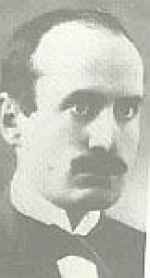
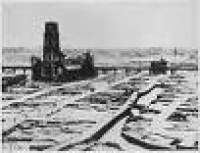
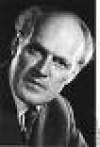

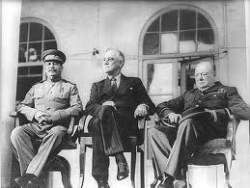

2. I deprecate the raising of these grave constitutional issues at a time when the only question is to avoid sheer chaos. You seem startled at General Busch giving orders. The orders seem to be to get the Germans to do exactly what we want them to do. We will never be able to rule Germany apart from the Germans unless you are prepared to let every miserable little German schoolchild lay its weary head upon your already overburdened lap. Sometimes there are great advantages in letting things slide for a while. In a few days when we have arrived at solutions to the more important questions requiring action and possibly gunfire, we will find a great many things will settle down. We can then lay down the great principles applicable to the qualities of vast communities.
3. It must of course be remembered that if Doenitz is a useful tool to us that will have to be written off against his war atrocities for being in command of submarines. Do you want to have a handle with which to manipulate this conquered people, or just to have to thrust your hands into an agitated ant-heap?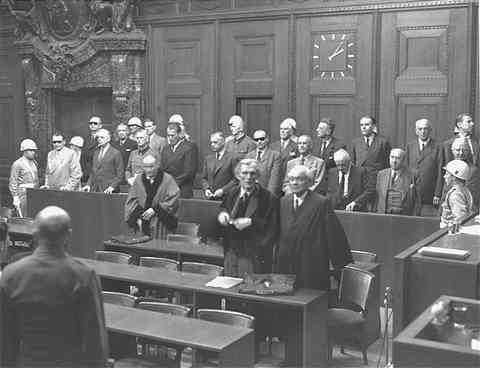
Colonel Phillimore: It is a very simple question to answer generally and it takes less time. Do you say that men captured in uniform should be taken out and shot without trial?
Wagner: I cannot consider men of whom I know that they have orders to commit crimes, as soldiers, within international law.
Colonel Phillimore: Are you saying that this action was perfectly proper—are you?
Wagner: Yes, entirely and perfectly.
Kranzbuhler: Will you please tell me now how this alteration was made in the log in the case of the Athenia?
Godt: In the case of the Athenia Oberleutnant Lemp reported on returning that he had torpedoed this ship, assuming it to be an auxiliary cruiser. I cannot now tell you exactly whether this was the first time I realized that such a possibility existed or whether the idea that this might possibly have been torpedoed by a German submarine had already been taken into consideration. Lemp was sent to Berlin to make a report and absolute secrecy was ordered with regard to the case.
Kranzbuhler: By whom?
Godt: By the Naval Operations Staff, after a temporary order had been issued in our department. I ordered the fact to be erased from the war log of the U-boat.
Kranzbuhler: And that, of course, was on the orders of Admiral Doenitz?
Godt: Yes, or I ordered it on his instructions.
Kranzbuhler: Did you participate in the further handling of this incident?
Godt: Only with regard to the question of whether Lemp should be punished. As far as I remember, Commander, U-boats, took only disciplinary action against him because it was in his favor that the incident occurred during the first few hours of the war, and it was held that in his excitement he had not investigated the character of the ship as carefully as he might have done.
Kranzbuhler: Korvettenkapitan Mohle testified that he asked Korvettenkapitan Kuppisch, who was a member of your staff, for an explanation of the Laconia order and that Kuppisch told him about the incident of the U-386; and told it in such a way as to make it appear that Commander, U-boats, ordered the shooting of survivors.
Hessler: That is impossible.
Kranzbuhler: Why?
Hessler: Because Kuppisch took his U-boat out to sea in July 1943 and never returned from that cruise. The incident of U-386 happened in the autumn of 1943, which was later.
1948 State of Israel proclaimed:

On May 14, 1948, in Tel Aviv, Jewish Agency Chairman David Ben-Gurion proclaims the State of Israel, establishing the first Jewish state in 2,000 years. In an afternoon ceremony at the Tel Aviv Art Museum, Ben-Gurion pronounced the words "We hereby proclaim the establishment of the Jewish state in Palestine, to be called Israel," prompting applause and tears from the crowd gathered at the museum. Ben-Gurion became Israel's first premier.
[For further details, Click here]
1950 Wunderwaffen:

1953 Spandau Prison: Albert Speer, serving a 20-year sentence for Crimes Against Humanity, writes to his daughter, Hilde:
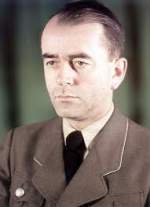
There is such a thing as mass hypnosis—we have seen it before in the life of nations—which can have incredible consequences. Let me remind you only of the witch-hunts of the Middle Ages, the horrors of the French Revolution, or the genocide of the American Indians . . . . In such periods there are always only a very few who do not succumb. But when it was all over everyone, horrified, asks, "For heavens sake, how could I?" (Sereny)
1954 Death: Heinz Guderian: Military theorist and General of the German Army during World War II:
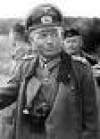
Born in Kulm, Germany, on 17th June, 1888. He joined the German Army and was commissioned in the Jaegers in 1908 where he became a communications specialist. He fought in the First World War and afterwards was a member of [a] right-wing Freikorps group. In 1922 Guderian became Inspector of Motorized Troops. He began to study the experience of tanks during the war and was greatly influenced by the ideas of British military writers such as Basil Liddell Hart and John Fuller. As a result of his studies he was employed as a teacher of tank tactics. Guderian was appointed commander of a motorized battalion in 1930. While in this post he developed one of companies as a tank scout company, one as a tank company and one as an anti-tank company. Guderian also developed a radio-communication system that enabled communication between tank officers. In 1934 Guderian was appointed chief of staff of the Motorized Troops Command and the following year he took over the 2nd Panzer Division. The other two panzer divisions were commanded by generals whereas Guderian was only a colonel.
In Feburary 1938, Guderian was promoted to lieutenant general and the following month was involved in the occupation of Austria. Later that year Adolf Hitler appointed Guderian to the new post of Chief of Mobile Troops. However Guderian had difficulty persuading his senior officers about the importance of tank warfare in any future conflict. Franz Halder, the Chief of General Staff told Guderian that the infantry would always play the most important role in any future war.
Guderian led the attack on Poland in September 1939 and his rapid success created shockwaves throughout the world. Despite this easy victory Guderian objected to the planned Western Offensive. When Hitler ordered the plan to go ahead, Guderian, who served under General Paul von Kliest, attacked at great speed and crossing the crossed the Meuse near Sedan on 14th May. Kleist now ordered Guderian to halt until the arrival of General Siegmund List and his 12th Army. Guderian disagreed with Kleist's view that the panzers needed the support of the infantry. After a heated argument with Kleist, who had the support of his superiors, Gerd von Rundstedt and Heinrich von Brauchitsch, on 17th May 1940, Guderian threatened to resign. Kleist responded by sacking Guderian. Adolf Hitler was unwilling to lose this brilliant commander and General Siegmund List was ordered to intervene and managed to persuade Kleist that Guderian should return to duty. Guderian got his way and Kleist's troops rushed ahead and reached the English Channel at Abbeville on 21st May 1940. Boulogne was taken on 23rd May but later that day Hitler called a halt arguing that the rapid advance was jeopardizing the whole campaign. Kleist supported Hitler's decision but Guderian was furious who rightly argued that this stopped the German Army cutting off the escape of the British Expeditionary Force (BEF) from Dunkirk.
Promoted to general for his achievements in France, Guderian led the 2nd Panzer Group during Operation Barbarossa. Working closely with Herman Hoth, Guderian's troops took Minsk and Smolensk. In July 1941 he moved into the Ukraine where he captured Kiev before moving on Moscow. Guderian was shocked by the stout resistance of the Red Army and as the severe Russian winter set in he made a limited withdrawal to better defensive ground. Guderian then returned to Germany where he argued with Adolf Hitler about the tactics being employed. After further disagreements with General Fedor von Bock and General Gunther von Kluge, On 25th December 1941 Guderian was dismissed from office.
After the defeats at El Alamein and Stalingrad, Hitler decided to recall Guderian and on 1st March 1943 he become commander of Germany's Armoured Troops. Guderian was unable to repeat earlier successes and in July 1943 lost one of the largest tank battles in history at Kursk. On 21st July 1944, Guderian replaced General Kurt Zeitzler as commander of the General Staff. As a result of the July Plot Guderian demanded the resignation of any officer who did not fully support the ideals of the Nazi Party. Over the next few months Guderian sat with Gerd von Rundstedt and Wilhelm Keitel on the Army Court of Honour that expelled hundreds of officers suspected of being opposed to the policies of Adolf Hitler. This removed them from court martial jurisdiction and turned them over to Roland Freisler and his People Court. Although willing to carry out a purge of the German Army, Guderian continued to argue with Adolf Hitler over strategy and on 28th March 1945 he was dismissed from office.
Guderian was captured by the US Army on 10th May 1945. Despite claims in the Soviet Union and Poland that Guderian was a war criminal, he was released from captivity on 17th June 1948.
1955 Cold War: The Warsaw Pact is formed:
The Soviet Union and seven of its European satellites sign a treaty establishing the Warsaw Pact, a mutual defense organization that put the Soviets in command of the armed forces of the member states. [For further details, Click here]
1961 USA: In Anniston, Alabama, a mob of Ku Klux Klansmen attack the buses of the Freedom Riders, who are riding interstate buses in the South in mixed racial groups to challenge local segregation laws. [For further information, click here.]
1986 Anne Frank: The Institute for War documents publishes the complete diary.
Edited by Levi Bookin (Copy editor) Click to join 3rdReichStudies Disclaimer: This site includes diverse and controversial materials--such as excerpts from the writings of racists and anti-Semites--so that its readers can learn the nature and extent of hate and anti-Semitic discourse. It is our sincere belief that only the informed citizen can prevail over the ignorance of Racialist "thought." Far from approving these writings, this site condemns racism in all of its forms and manifestations.
levi.bookin@gmail.com











Fair Use Notice: This site may contain copyrighted material the use of which has not always been specifically authorized by the copyright owner. We are making such material available in our efforts to advance understanding of historical, political, human rights, economic, democracy, scientific, environmental, and social justice issues, etc. We believe this constitutes a "fair use" of any such copyrighted material as provided for in section 107 of the US Copyright Law. In accordance with Title 17 U.S.C. Section 107, the material on this site is distributed without profit to those who have expressed a prior interest in receiving the included information for research and educational purposes. If you wish to use copyrighted material from this site for purposes of your own that go beyond 'fair use', you must obtain permission from the copyright owner.
Please Note: The list-owner and the moderator of 3rdReichStudies are not responsible for, and do not necessarily approve of, the random ads placed on our pages by our web server. They are the unfortunate price one pays for a 'free' website.



